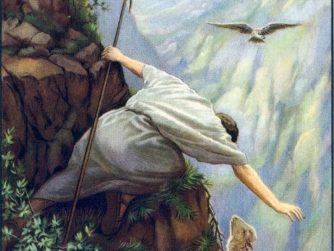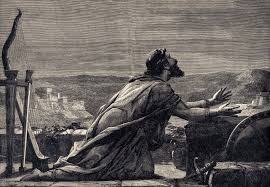Excerpt from the e-book – “The Presence of God: Foundation for Adop
tion, Inheritance, and the Eternal Kingdom”
From the beginning with the first Parents- Adam and Eve, the flesh has proven itself incapable of producing righteousness or fulfilling God’s will. It cannot be reformed, improved, or salvaged—only put to death. This truth is evident in David’s household, where his first lineage remained under a curse, bound to destruction despite every effort to restore or redeem it. David’s sons—Amnon, Absalom, and Adonijah—each exemplified the self-destructive nature of the flesh.
Amnon, driven by an unexplainable and abominable lust as a result of the curse in his lineage, violated his half sister Tamar. Absalom, consumed by unforgiveness, avenged his half sister, Tamar and killed Amnon for defiling his sister. He was not repentant, left his father’s kingdom and went on exile for three years in another country to seek refuge from the prince of the country.
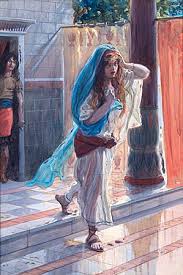
His conduct was similar to that of Cain who despite killing his brother Abel was not remorseful but walked out of God’s presence to build his City/Kingdom – this is the sinful nature at work. As David’s heart longed for Absalom so does the heart of God longs for sinners like Cain and Absalom to return to him. Just as the father longs for the prodigal son so God longs for his children who have gone after their fleshly lust far away from Him. In Genesis 6:3, God’s Spirit longs and strife for His children to return to Him but He saw that they preferred to walk in the flesh.
The only condition for God’s presence to be restored to his backsliding children is if they become repentant, broken and return to Him in humbleness like the Prodigal Son – put to death their sinful nature – pride and arrogance.
Absalom was not repentant, not broken when Joab through his crafty intervention with the wise woman of Tekoah was returned to Israel. The woman’s mournful state, her sweet spiritual words and convincing lips were so touching to David. She even referenced God’s name to be used as a plea so that David can be caught and even said David was like the Angel of God. She sermonized David to the point that he had to take back Absalom. She reminded David that his son was to be in Israel, the inheritance of God.
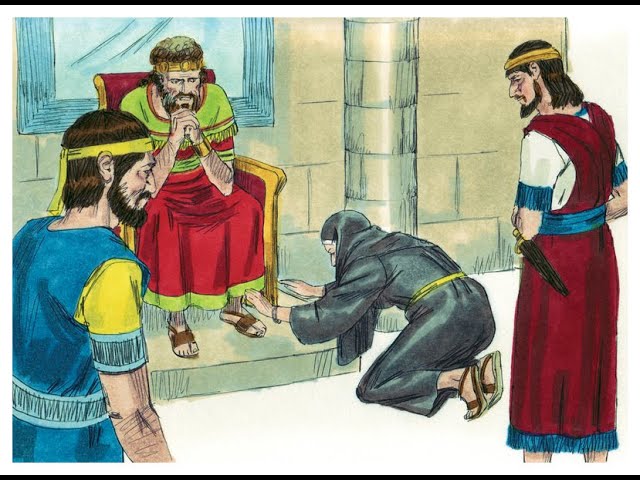
“Be spiritually watchful not to admit an unrepentant or unbroken brother or sister into the fellowship of the brethren, lest they grow wild and defile many.”
When Absalom was returned from exile he drew the heart of the people to himself through his beauty and that of his family. He became more arrogant and Joab got the first consequences of his arrogance – he burnt his farm crops. He began to steal the heart of the men of Israel, gather some of his father’s key and trusted men to take the kingdom of his father just as Lucifer stole the heart of one-third of God’s angels and wanted to exalt himself above God to usurp God’s authority.
Anyone that smuggled an exiled, unrepentant, self-centered brother or sister back to the fellowship of the brethren will also bear the brunt of his wicked heart, if not first.
Any pardon given to the unbroken backsliding christian and restored to the fellowship of the brethren, church, he will only grow more pompous, arrogant and wreck more damage to the church. His new aim might not be brethren in the body of Christ alone but he might aim for the elders, and poison the Church, through conspiracy, gossip, stealing the heart of members, forming sects in the body and pride. Thus we see that God sent Lucifer away from heaven. Thus church elders must not be weak like David but they must excuse such people from the church. 1 Cor 5:13
Absalom was brought back to the Kingdom of Israel, he was not remorseful but arrogant, ambitious, rebellious spirit and conspired against his father. In a bold display of contempt and dishonour, Absalom publicly lay with his father’s concubines in full view of all Israel—an act intended to assert dominance and to make a definitive break from his father’s authority (2 Samuel 16:22). Yet, despite his schemes and rising influence, Absalom was ultimately cut off in judgment. His pride became his downfall. As he fled, his head—specifically, his hair, which symbolized his glory with which he drew the heart of many in Israel—was caught in the branches of a tree, leaving him suspended between heaven and earth (2 Samuel 18:9). He hung upon the tree – he was cursed for he was of the flesh. Curse is any man that hangs upon the tree, Deuteronomy 21:23. There, hanging by what once made him admired, he met his end—a sobering reminder that rebellion against divine authority leads to ruin.
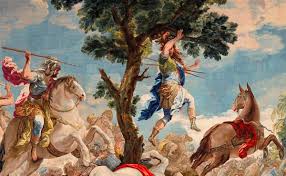
Oh! Lord please let not my soul come into their camp and not be deceived by their cosmetic and eloquence.
When will you allow your sinful nature to die with Christ on the cross before its curse finishes your life like that of Absalom?
This was similar to Lucifer – In Ezekiel 28:11-17, God said, the king of Tyre, a symbol of Lucifer, was lifted up because of his beauty, he corrupted his wisdom by reason of his brightness (beauty) and God promised to cast him to the ground shamefully.
Holding on to the sinful nature is giving room to the devil to fill us with his corrupt life. Repent and turn to God. You cannot improve this nature. Any mercy the sinful nature receives will still turn him over to destruction.
Adonijah, despite witnessing the downfall of his brothers, still pursued his own desires and wanted to take over the kingdom, the throne which God had reserved for Christ. In a final desperate attempt to preserve his life, Adonijah fled to the altar of God and held onto its horns (1 Kings 1:50-51), believing that the sacred altar would shield him.
However, even if the flesh touches holy things, it remains unchanged. Sacred rituals, religious acts, or outward expressions of devotion cannot sanctify what is inherently corrupt.
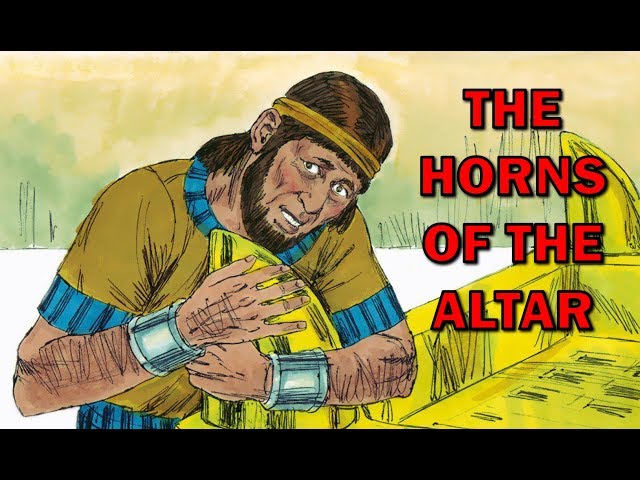
Adonijah’s plea at the altar did not change his heart; he remained the same man seeking his own way. Even after Solomon, in a gesture of mercy, allowed him to live, Adonijah sought to take Abishag, his father’s concubine—an act that sealed his fate and led to his execution. His later actions proved that the flesh cannot be restrained by external holiness—it must be put to death.
The pattern is clear: the flesh refuses correction and persists in its own way until it meets destruction. No rebuke, mercy, or second chance can change its nature. Despite God’s many interventions to mankind throughout the Old covenant, it only exposes that the flesh is Irredeemable.
The flesh will always resist the Spirit and must ultimately be put to death (Galatians 5:17). It cannot be improved, refined, or accommodated in God’s kingdom. This is why Christ did not come to reform sinful nature but to crucify it and offer new life through the Spirit. The sinful nature must die for the new man in Christ to live. As Paul said, “Flesh and blood cannot inherit the kingdom of God, nor does the perishable inherit the imperishable” (1 Corinthians 15:50).
Thus, the only way to escape the destructive consequences of the flesh is to be born again—not of corruptible seed, but of incorruptible, by the word of God that lives and abides forever (1 Peter 1:23). Holding onto religious symbols or sacred traditions, as Adonijah did, will not transform a man. Only through the death of the old nature and resurrection into the life of Christ can one truly be redeemed.
Come to Jesus today for He is waiting to redeem you!
Rebellion, Rejection and Spiritual Blindness: The Pattern of David’s first household and Israel – the flesh
Galatians 5:17 TPT: When your self-life craves the things that offend the Holy Spirit you hinder him from living free within you! And the Holy Spirit’s intense cravings hinder your self-life from dominating you! So then, the two incompatible and conflicting forces within you are your self-life of the flesh and the new creation life of the Spirit.
The flesh works contrary to the new creation life. It rebels and rejects God’s ways and cannot understand the things of the Spirit of God. This was pictured in the rebellion and rejection of David and Jesus as King by their own people – the Israelite and the Jews respectively. This led to their spiritual blindness and they remained a spiritual and physical slave to sin and their enemies.
- Rebellion and Rejection
Psalm 2 captures the rebellious heart of the nations—and of Israel itself—against God’s appointed King. Just as Absalom led a revolt against his father David, and Adonijah arrogantly contested Solomon’s divine appointment, so too did both Israel and the nations rise in defiance against God’s true King—Jesus Christ.
In Psalm 69, David probably confessed his own guilt regarding Uriah but his people still rejected him:
“You, God, know my folly; my guilt is not hidden from you.” – Psalm 69:5
Yet within that same psalm, he spoke prophetically—both of Christ and of himself—as one rejected and isolated: “I am a foreigner to my own family, a stranger to my own mother’s children.” – Psalm 69:8 (cf. John 1:11).
“For the zeal for your house consumes me, and the insults of those who insult you fall on me.” – Psalm 69:9 (cf. John 2:17).
He also described the mockery from the leaders and elders: “Those who sit at the gate (leaders and elders) mock me, and I am the song of the drunkards.” – Psalm 69:12
This mockery included Ahithophel—Bathsheba’s grandfather—who was among those who turned against David. But the traitors did not discern that it was the Lord who had disciplined David for his sin (Psalm 69:26) and later restored him in mercy (Psalm 32:5). Rather than rejoicing in God’s forgiveness, they joined in the rebellion of David’s cursed son, attempting to replace him.
David, facing rejection from his people (Israelite), wept on the Mount of Olives for the evil that will befall his people: “David continued up the Mount of Olives, weeping as he went…” – 2 Samuel 15:30–32.
Jesus also wept over Jerusalem from that same mount because of the evil that shall befall them for rejecting the kingdom of Christ: “As He approached Jerusalem and saw the city, He wept over it and said, ‘If you, even you, had only known on this day what would bring you peace—but now it is hidden from your eyes.’” – Luke 19:41–42
- Spiritual Blindness
The consequences of this rebellion and rejection of David and Christ was spiritual blindness. This spiritual blindness was partially fulfilled when David was rejected as King. David prophesied God’s judgment on them:
“May their table become a snare and a trap…, a stumbling block and a retribution for them. May their eyes be darkened so they cannot see, and their backs be bent forever.” – Psalm 69:22–23 (cf. Romans 11:9-11)
Isaiah also prophesied about the blindness of the children of Israel—a judicial hardening permitted by God: “For the LORD hath poured out upon you the spirit of deep sleep, and hath closed your eyes: the prophets and your rulers, the seers hath he covered.” Isaiah 29:10
This blindness was totally fulfilled when Jesus was rejected as their Messiah – their King, by His people the Jews:
“… If you, even you, had only known on this day what would bring you peace—but now it is hidden from your eyes.’ – Luke 19:41–42
Paul burdened for the Jews described to the believers in Rome the spiritual of the Jews: “God gave them a spirit of stupor, eyes that could not see and ears that could not hear, to this very day.” – Romans 11:8
Jesus was supposed to bring peace to the Jews from the enemy within – the flesh that had made them enemies of God – separated from God and the enemy without – the Roman, that was ruling over them.
This serves as a warning: never conspire against God’s chosen vessels. Even when they fall, if they repent, God can and will restore them. The danger is that you may not recognize the moment of their restoration—and your gossip or bitterness in the time of their fall may align you with the very conspirators whom God will judge. Be careful: such rebellion can open the door to spiritual blindness. You may unknowingly join the same spirit that blinds and hardens.
Israel made this error repeatedly. They chose Saul, Absalom, and Adonijah—men who appeared outwardly impressive, matching the world standard—over God’s chosen ones. In the same way, angels followed Lucifer (son of the morning) whose beauty got into his head and decided to rebel against God, and many including leaders in different Church denominations today still follow the path of rebellion against God’s anointed.
This is the partial blindness that has come upon Israel. Israel did not stumble and fall beyond recovery, but they fell because they were disobedient and rejected their King, so God made salvation available to the Gentiles. God wanted his own people (Israelite) to be jealous and claim it for themselves (Roman 11:10). It is not final rejection, but a pause in God’s dealing:
“I do not want you to be ignorant of this mystery, brothers and sisters, so that you may not be conceited: Israel has experienced a hardening in part until the full number of the Gentiles has come in.” – Romans 11:25
So when David the King was rejected and he ran from Absalom, were one of the first to stand with David – all the Cherethites, all the Pelethites, Ittai, the Gittites, 600 men came from Gath also came in and were involved in the restoration of David as King during Absalom’s rebellion.
2 Samuel 15:18–22 describes how David was fleeing Jerusalem due to Absalom’s rebellion, all the Cherethites, all the Pelethites, and the Ittai the Gittite, 600 men from Gath (a Philistine city, indicating they were Gentiles) came to accompany him. David even gave Ittai the option to return and not share in his hardship, but Ittai replied:
“As surely as the Lord lives, and as my lord the king lives, wherever my lord the king may be, whether it means life or death, there will your servant be.” — 2 Samuel 15:21
Is your devotion to God like these gentiles. Do you turn back from Jesus the King when things are dark and uncomfortable.
Prayer:
Lord I lay my all on the altar for you. I surrender this sinful nature to you to be put to death on the cross. Give me a new life and help me to walk with you in this new life through your Holy Spirit.



